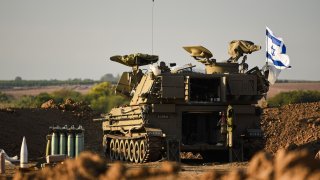A Year After October 7, Iran is Still the Problem
The West’s obsessive search for diplomatic “off-ramps” and its fear of escalation and the use of force have only encouraged the burgeoning aggression from Tehran.
I arrived in Israel with plans to spend the Jewish New Year, Rosh Hashanah, with my daughter and son-in-law. Instead, we spent two nights in a bomb shelter. The first missile salvo was launched by Hezbollah from Lebanon. Then came nearly 200 ballistic missiles launched by Iran and aimed at Israel’s major cities and towns. On Monday, I had to shelter at the Ben Gurion airport as a Houthi missile hurtled toward Tel-Aviv. It was shot down. If not for the Arrow and Iron Dome defense systems and support from the U.S. Navy, thousands of Israelis would have been killed and wounded.
Israel is a vibrant country, but the entirety of Israeli society is deeply traumatized. Last October 7, fifty years after Egypt and Syria unleashed the Yom Kippur War, the Islamist Hamas organization, recognized as a terrorist by the U.S. and the EU, attacked Israel on yet another religious holiday. Instead of spending that day dancing and giving thanks for the gift of the Torah that is the central staff of Jewish life, Israelis woke up to the news of an orgiastic, bloody massacre.
In small agricultural communities near the Gaza border and at the nearby rave Nova music festival, Hamas and its Gazan supporters tortured, raped, and murdered some 1,200 men, women, and children. Over 240 hostages were dragged into the massive tunnel network built with stolen aid money under the Gaza Strip. A year later, roughly 100 of those hostages are still in Hamas’ hands, with several of them likely murdered by their captors.
The very next day, Hezbollah, the terrorist Iranian proxy and the largest non-state army in the world, began launching Iranian missiles into Israel from Lebanon. Since then, they have fired some 9,500 missiles into Israel, killing and wounding dozens of Israelis by targeting towns and villages, including a playground full of Israeli Druze children.
Hezbollah’s assaults have forced the evacuation of some 10 percent of northern Israel. About 67,500 Israeli civilians, the equivalent of 2,328,000 Americans by percentage of population, have been turned into internally displaced persons—refugees in their own country.
No government could tolerate these vicious attacks. Israel finally started a targeted campaign to eliminate Hezbollah’s leadership, many of whom were also responsible for the murder of 240 American Marines and dozens of French paratroopers in 1983. These mass murderers had U.S. government bounties on their heads.
Israel is also facing the necessity of retaliating for the latest barrage of Iranian ballistic missiles—the second such direct attack on Israel by Tehran during this past year. Iran is weeks, if not days, away from having an operational nuclear device, something a succession of U.S. presidents have said cannot be allowed to happen. For Israel, a nuclear-armed Iran is a clear and present death threat. However, instead of strengthening Israel’s hand, President Biden has been telling Jerusalem not to hit Iranian nuclear infrastructure and oil facilities.
Iran today is a de facto ally of Russia in its war on Ukraine, supplying thousands of drones and missiles to Moscow. Russian weapons are being found in Hezbollah tunnels in Lebanon. In addition to supporting and training Hamas and Hezbollah, Iran trains and equips the Iraqi Kata’ib Hezbollah, who have attacked American troops in the region, and the Houthi terrorists, who have targeted marine traffic and trade in Bab-El-Mandeb Strait at the southern entrance to the Red Sea, effectively shutting the Suez Channel for close to a year. These Iranian proxies have also repeatedly attacked Israel.
The Middle East has been taken hostage by Iran and its proxies from Yemen to Lebanon to Syria to Iraq. The mullahs in Tehran carry an imperial nostalgia that goes all the way back to Darius and Xerxes, the Persian emperors of 2,500 years ago. This situation cannot continue. It is not only a mortal threat to Israel and the Sunni-majority Arab countries. This is a once-in-a-generation test of Western, American-led leadership and resilience. The Shia theocratic dictatorship oppresses the Iranian people and has unleashed its dogs of war.
The West’s obsessive search for diplomatic “off-ramps” and its fear of escalation and the use of force have only encouraged the burgeoning Iranian aggression. Instead of slowing down the delivery of needed weaponry to Israel and forcing an ally to face a powerful aggressor without adequate help—as was done to Ukraine—the time for U.S.-Israeli action to finish off Hamas, Hezbollah, and the Houthis and to defang Iran is now. This would send a strong message to Moscow and Beijing that America is back, standing tall for itself and its allies, and still backing the causes of liberty, democracy, free markets, and basic human decency, unafraid of authoritarian challengers and unbowed by their hatred and threats.
If America fails this test, Israel will continue to fight—it has no choice. However, displays of weakness by Washington will only signal that the United States and the West are vulnerable to further attacks at a time when anti-status quo powers actively seek to reverse the global balance of power and push America into terminal decline. No matter how hard this truth may be, appeasement will not bring “peace in our time,” to quote Neville Chamberlain. Like in 1938, after the Munich Agreement with Hitler, appeasement can only invite more war.
Ariel Cohen, Ph.D., a Senior Fellow at the Atlantic Council, currently serves as the Managing Director of the Energy, Growth, and Security Program at the International Tax and Investment Center.
Image: Shutterstock.com.

